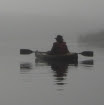I have never been responsible for the milking of a cow. I think I may have had a little try at milking, once or twice in the dimly remembered past, but it was never one of my daily chores.
I find myself thinking about the task of milking (or should I call it an art?) as I begin to explore the idea of mindfulness. Oh, sure, I've had a little try at mindfulness now and then, too, but recently I have decided that it is a key to my growth and to the healing of some troublesome patterns in my life. I have finally faced the fact that my daydreams are damaging me. Around the same time, perhaps as a cause or perhaps as a result, several experiences have pointed towards the need and the path for change.
At a retreat I attended in October, I somehow got the idea to be wordless as I went for a walk on a winding trail up the steep side of a coulee. It was native vegetation, bush and prairie grass, rich with species that I could name, but I chose not to. Taking that idea further, I chose again and again not to analyse what I was seeing, or even to narrate it in my mind, but simply to receive. No imagining how I would describe the experience later, no toying with expressive phrases, no words at all.
Paradoxically, later I found myself able to bring the entire experience vividly back to mind, and thus to describe it in as much expressive detail as I might desire, precisely because I had not been distracted during the experience by the imagined retelling of it.
It occurred to me that I smear my past, present, and future together by constantly planning and rehashing instead of being present. Nothing gets my full attention. How much benefit do I get by all this absent thought? Could I just re-assort my mind-time so that most of it was focussed on the now? If I practise being present, will that be just as good preparation for future present moments as if I imagine them and try to plan for them?
Another thought occurred to me, that if I spend most of my time being present, I will need to take some time being totally present to activities like planning, and thinking of people far away, and so on. I worry that I won't have time for that sort of focus, if I stop doing it while in the midst of something else. But maybe I will.
When I returned from the retreat, I was determined to find some books I had stashed away, books about the Enneagram, to further my self discovery. I had assumed that they would be hard to find, but they were near the top of the first box I checked. Then I heard about an Enneagram workshop, and found some online resources, and noticed that some Enneagram teachers recommended the works of Eckhart Tolle.
That same day, visiting across the street, I noticed a book by Eckhart Tolle called "The Power of Now." I borrowed it.
Meanwhile the busyness of life continued, and living from deadline to deadline, I struggled with increasing domestic chaos. I know I need a routine, but I fear imposing a routine on myself, and missing out on some important direction that I would take if I just went with the flow. Finally I decided that I must make a plan. In fact, that is the plan: to make a plan. It still hasn't happened, but like a seed invisibly changing under the soil, there is movement and new energy in my life. Lying in bed one morning, noticing how often I lie idly planning and rehashing and daydreaming in the early morning, I decided on just two things as the beginning of a plan. I gave them alliterative names to keep them in mind: Mindful Mornings, and Being in the Bathroom.
No, no, I don't mean spending a lot of time in the bathroom! I mean really Being there when I am there. And leaving when I'm finished! Otherwise I can linger on the throne of thought until my legs go numb.
I am resisting these ideas, fearing the change, fearing the loss of something, but I haven't given up on them yet.
Last night I started reading "The Power of Now." I was delighted to find a bit about being present while washing hands, noticing the slipperiness of the soap. This morning I am a flurry of activity with facing what's really in front of me, and making lists of all the things I can't fix all at once, and worrying that I will do the easy things first and not have time for the rest but finding that I am really getting a lot done. Folding clothes, I caught myself thinking about something else and realized that, in the midst of some other train of thought, I could easily fold and shelve things without even noticing that they need mending. I am about to start the dishes, and waffling. Shall I focus on the soapy water and the surfaces coming clean, or shall I use this time for some reflection on other things?
I've heard that when you milk a cow, you may have to quiet your mind before she will let down the milk. And so I bring a question for my elders on the path of right living. (Eleutheros and Contrary Goddess and Madcap Mum and Jim at Earth Home Garden, I'm thinking of you.) Do you milk (or quilt or gather eggs) mindfully? Or to put it another way, when you ponder the questions of the universe, do you keep your hands busy?
********
Maybe Eckhart Tolle will have some answers for me. I'm sure life will. I'll let you know. Right now, though, I'm running out of time to get those dishes done.
another year
4 weeks ago




